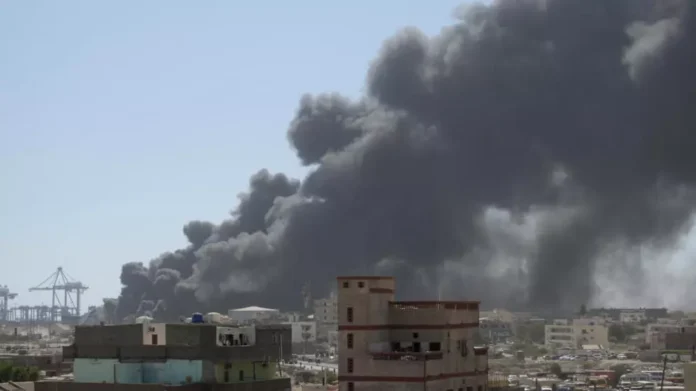Sudan has once again accused the United Arab Emirates (UAE) of “attempts to silence Sudan’s voice within the United Nations Security Council and to obstruct its role in maintaining international peace and security,” according to its official statements.
Following a closed session of the Security Council, Sudan’s Permanent Representative to the UN, Ambassador Al-Harith Idris, expressed his country’s discontent with the way the session was managed. The session was dedicated to discussing drone attacks on Port Sudan and other vital installations, as reported by the Sudan News Agency (SUNA).
Idris directly accused the UAE of carrying out the attacks on Port Sudan using advanced drones launched from Emirati military bases on the Red Sea, and at the request of the Rapid Support Forces (RSF). He asserted that these attacks targeted Port Sudan Airport and the city’s oil and service facilities.
He further stated that Sudan possesses precise intelligence indicating that the May 4 attack originated from a UAE military base, involving drones likely of the “MQ-9” or “MQ-9B” models, as well as suicide drones, with logistical support from Emirati naval vessels in the Red Sea.
The Sudanese envoy linked this escalation to a retaliatory response for an operation carried out by the Sudanese Armed Forces on May 3 in Nyala, targeting an Emirati military aircraft and resulting in the deaths of 13 foreigners, including Emirati personnel and a Kenyan co-pilot.
He considered that this operation may have been the direct motive for the attack on Port Sudan, as part of an escalatory approach by the UAE to compensate for RSF losses after their setbacks in central Sudan.
These developments reflect a significant escalation in the conflict between the parties, with each seeking to strengthen their military positions and achieve strategic gains, thereby increasing the complexity of the security situation and exposing civilians to greater risks amid ongoing clashes.
It is noted that Omdurman, part of the capital Khartoum, has for weeks witnessed intermittent clashes between the Sudanese army and the RSF, as both sides vie for control of strategic locations in the capital and other cities, amid warnings about the humanitarian and security consequences of these confrontations.
The war in Sudan erupted on April 15, 2023, between the army led by Abdel Fattah al-Burhan and the RSF led by Mohamed Hamdan Dagalo (Hemedti), mainly centered in Khartoum but spreading to other regions, resulting in hundreds of civilian casualties4. Despite mediation efforts by Arab, African, and international parties to achieve a ceasefire, a permanent end to the fighting has not been reached


